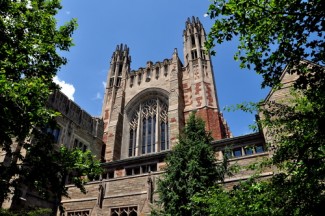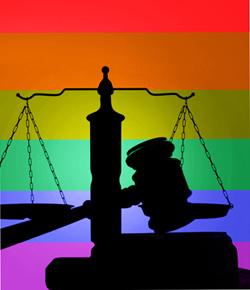Nondiscrimination policy at Yale Law School is legal but perhaps should be changed, lawyers say

Yale Law School. Image from Shutterstock.com.
Updated: A nondiscrimination policy at Yale Law School, which prohibits fellowship funding with organizations that won’t hire applicants who are gay, probably does not violate any federal laws. Nevertheless, some legal experts say that the institution might want to rethink how it is written.
In April, U.S. Sen. Ted Cruz, R-Texas, claimed that the law school’s anti-discrimination policy amounted to “unconstitutional animus and specific discriminatory intent,” Yale Daily News reported. Cruz said that he would investigate the policy in his capacity as chair of the Senate Judiciary Committee’s Subcommittee on the Constitution.
Heather Gerken, the law school’s dean, in a statement said that defending religious liberty is a serious responsibility, and the anti-discrimination policy is simple.
“Going forward, we will not fund the work of an employer that refuses to hire students because they are, for instance, Christian, black, a veteran or gay. Without that policy, we would be forced to subsidize employers that discriminate against our own students. That we will not do,” the statement read. It also noted that she had assembled a committee to “deliberate and craft an appropriate strategy.”
“They’re not guilty as charged and are dealing with the issue. Whether they deal with it well or badly remains to be seen. In terms of what she’s saying, there’s no intention to exclude employers with serious religious convictions,” says Douglas Laycock, a University of Virginia law school professor and church-state scholar.
Laycock has served as lead counsel in six U.S. Supreme Court cases regarding religious freedom, and he notes that the law school’s nondiscrimination policy only applies to organizations’ hiring practices, not their ideologies. Also, because Yale is a private institution, he can’t think of any federal regulation that would prohibit its nondiscrimination policy. However, he thinks that language should be added to state that the law school does not require religious organizations—or groups with fundamentally religious missions—to violate requirements of their faith.
Laycock does not know of other law schools that include sexual orientation in nondiscrimination policy for fellowships. He notes that Yale Law School—which besides student and postgraduate fellowship funding provides loan forgiveness for some graduates working in public interest—has a much better-funded program than most law schools.

Of the law schools that do have nondiscrimination policies for fellowship funding, most require employers to certify that they adhere to the requirements, says Robin Fretwell Wilson, a law professor at the University of Illinois. If Yale has that policy, she adds, some groups would be reluctant to sign the agreements.
“I’m not saying that they are discriminating against religious groups, but there will be a set of religious groups that will be diminished because they would not want to sign a certification,” says Wilson, who helped the Utah State Legislature in 2015 amend existing laws to prohibit housing and employment discrimination based on gender identity and sexual orientation.
Jason Clagg, partner and vice chair of Barnes & Thornburg’s higher education group, says that the law school’s nondiscrimination policy is unique.
Regarding religious freedom, the Fort Wayne, Indiana, lawyer says that there is a simple solution: state that fellowships will not be funded at organizations that have illegal hiring practices. He adds, many states and municipalities and some federal circuits prohibit employment discrimination based on sexual orientation.
“That recognizes an accommodation for religion, and it also says that ‘we’re not talking about broad policy positions, we’re talking about hiring,’ ” Clagg says.
It’s probably unlikely that most organizations, including those that represent clients opposed to same-sex marriage, would ask employment candidates about their sexual orientation, says Greg Nevins, a senior counsel with Lambda Legal. That’s true for his organization, too.
“When we interview for interns and lawyers, sexual orientation is not an issue; a commitment to our issues is. Organizations want to make sure that a potential student intern will be in line with their policies and is not a mole. They are allowed to ask questions to get at the person’s position and loyalty,” he says.
Sometimes, Nevins adds, a student candidate is not familiar with an organization’s goals, and clarification is needed. He mentioned the Alliance Defending Freedom, an Arizona group that represented baker Jack Phillips in his 2018 U.S. Supreme Court case Masterpiece Cakeshop v. the Colorado Civil Rights Commission. The organization also represents the employer in a pending U.S. Supreme Court case out of the 6th U.S. Circuit Court of Appeals at Cincinnati, which found that Title VII protected a funeral home director who was fired after disclosing that she was transitioning from male to female.
Nevins says that if he were with the Alliance Defending Freedom and interviewing a Yale Law School fellowship candidate who appeared to be in transition, he would ask if they were aware of the organization’s work in the 6th Circuit case.
“If the interviewing process began with a gap in information, that needs to be made up, so everyone knows exactly what they are getting into,” he says.
Michael P. Farris, the ADF’s president, CEO and general counsel, told the ABA Journal in an email that they do not ask candidates about “sexual activities.”
“We ask if they share our religious beliefs and mission, as do tens of thousands of other faith-based charities and advocacy organizations,” he wrote.
Updated May 1 at 9:44 a.m. to add the comment from Michael P. Farris.



